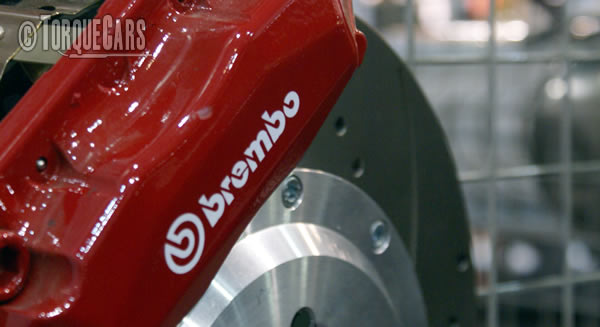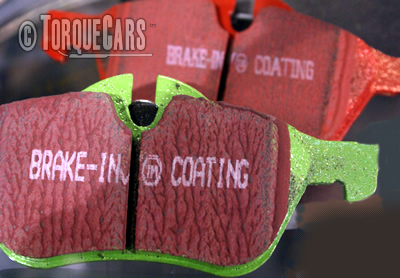Causes and prevention of Brake fade
"Fade accompli"
This phenomenon known as brake fade can be quite unexpected and lethal and I would hazard a guess that 1 in 4 cars are likely to experience brake fade to some degree.
Brake fade manifests itself by a spongy feel on the pedal and little or no braking force. Do not confuse brake fade with bad brakes or a mechanical fault as it applies to brake systems in relatively good condition.

You are at greater risk from brake fade if you do not change your brake fluid frequently. As the brake fluid is Hygroscopic it draws in water which is the main problem. The fluid within the brake fluid boils and releases gases causing spongy braking as unlike fluids gases are compressible. A dot 5.1 brake fluid performs better and over a longer period of time without the issue of water retention.
The primary reason for brake fade in a good well maintained car is the heat build up which can adversely affect the friction and even cause warping or distortion of the brake components. Brake fade in these cases will still, usually, have a firm pedal but the conversion of momentum into heat cannot effectively happen so the car does not slow up.
A brake pad will start to smoke as it gets beyond its operating temperature, the layer of gas emitted will act as a lubricant between the two friction surfaces and will be manifest as ineffective brakes. The effectiveness of the friction surfaces also reduces as heat increases which is why performance brakes are designed to operate at a much higher temperature than OEM parts. (The obvious downside of performance brakes is poor cold braking, not something you want on a road car.)
When you use your brakes you are converting the forward momentum of the car into heat. The heat will build up on the discs where it will be dissipated into the air. The pads will also get warm and this heat will also transfer along the pistons and callipers into the brake fluid and if water is present in the brake fluid you are very likely to experience brake fade as the water heats up and boils. The heat can also cause the brake hoses to expand a little reducing the hydraulic pressure even further.

The first tip is somewhat obvious but I still see so many people doing this one. To avoid brake fade do not keep your brakes on when driving down a hill, change into a lower gear and let the engine maintain a safe speed for the car.
When people get to the bottom of a hill they suddenly realise that their brakes are no longer effective. (When the brakes get really warm you also run the risk of binding where the pads get "welded" to the brake disc)
Rather than brake heavily at the last minute try to spread your braking over a longer distance. An emergency stop from 70 is sometimes enough to cause brake fade and these higher speed speeds a failure of the brakes can be quite lethal. So jab the brakes quite hard at first and kill most of your forward momentum, the speed you are travelling at will help the discs to dissipate the heat and then reapply the brakes more gently bringing the car to a stop. If you have made heavy use of your brakes always assume that fade will manifest itself for the next few minutes and increase your distance from the car behind and keep your speed down a little.
On the track is not uncommon for the heat in the brakes to cause the discs to glow red or white hot and cheap pads have been known to smoke, a good quality pad for the track is designed to cope with the high temperatures and often not 100% effective until it warms up. When you have new brake pads or discs fitted you should use them gently at first as they will not be effective until they are properly bedded in.
Use a dot 5.1 brake fluid and change the brake fluid annually. Larger discs and high performance pads can also help minimise brake fade although at the extreme end they can exhibit very poor cold braking properties. See our article on brake uprating for some ideas and tips on uprating your brakes and further reduce your risk of experiencing brake fade.
If you liked this page please share it with your friends, drop a link to it in your favourite forum or use the bookmarking options to save it to your social media profile.
Check out TorqueCars new YouTube channel, and see their awesome new content...
Feedback
Please use our forums if you wish to ask a tuning question, and please note we do not sell parts or services, we are just an online magazine.
Help us improve, leave a suggestion or tip
